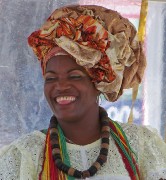Klaus Hart Brasilientexte
Aktuelle Berichte aus Brasilien – Politik, Kultur und Naturschutz
Befreiungstheologe Frei Betto in Brasilien 2008: „The social control of municipalities“
We will be having municipal elections in October this year. Through our vote and our taxes we will be giving employment and power to those who, in our name, must administer the municipality. Pressured by the media, by election propaganda, by friends and family and even by blackmail from election campaigners, many people vote without knowing who the candidates for town councillor or mayor are.
Â
Brazilian democracy however has matured in spite of politicians who make alliances without any programme proposals and concentrate simply on one obsession: to remain in power.
We don™t always remember the name of the candidate to town councillor for whom we voted in past elections. At present there is a movement in Brazil which aims at denying the vote to those who are being prosecuted in the law courts. Voters have at least the right to know if their candidate has a curriculum, a clean police record, a criminal record or sentence against him or her.
In a participatory democracy councillors should represent the will of the voters. How often has your councillor asked for your opinion? As a rule many councillors only represent corporative interests such as those of public transport or of speculation in real estate. Many of them, once in office and co-opted by the municipal executive, go against everything they promised during the election campaign.
There is now something new, not in the state of Denmark, but in Brazilian democracy: the control of municipal government by civil society. In the run-up to the elections for new mayors, the initiative deserves to be reproduced in the whole country. It is the Movimento ”Nossa Sáo Paulo  (”Our Sáo Paulo Movement).
The movement is non partisan and is composed of about 450 social movements and institutions interested in improving the quality of life in the largest Brazilian metropolis by reducing the chasm between the municipal government and the population and by strengthening participative democracy.
The Nossa Sáo Paulo movement was born almost two years ago. It established work groups to study the possibility of making the city more habitable and the administration more efficient. In February 2008 it managed to introduce an amendment to the Municipal Law which obliges the next mayor to present a detailed programme of plans based on guidelines for each municipal administrative area and for each one of the 31 sub municipalities and the 96 districts in Sáo Paulo, within 90 days after his (her) investiture. Â Â Â
When establishing goals the executive contributes towards greater control of public funds i.e. how the money invested by the population through taxes and entrusted to the government to administer and spend, is used. Â Â Â Â Â
In May the Movement promoted the First Nossa Sáo Paulo Forum “ Proposals for a Just and Sustainable City – in which I participated together with 750 representatives of civil society who analysed the city™s main social, economic, political, environmental and urban challenges outlined by civil society and by the Movement™s city work groups.
On July 21 the 1500 proposals for the construction of a just and sustainable city received from social movements, universities, businesses and interested citizens will be handed over to Sáo Paulo™s mayoral candidates. At that time each candidate will be allowed to speak for ten minutes. It is hoped that they will include the proposals in their election and government programmes.
Initiatives such as these contribute towards improving the level of our political representatives. Ethics doesn™t simply mean rejecting corruption and not taking advantage of one™s office for personal gain or for helping family or for corporativism. It also means consistency of principles, service towards the common good and respect for the will and aspirations of citizens.
We ask that God “ and all of us voters “ will make these changes come about. We will thus be raising the level of Brazilian democracy, making it truly participative.
    Â
*Frei Betto is a writer, author of ”A Mosca Azul (The Blue Fly) (Rocco).
ABOUT THE AUTOR
He is a Brazilian Dominican with an international reputation as a liberation theologian.
Within Brazil he is equally famous as a writer, with over 52 books to his name. Â In 1985 he won Brazil™s most important literary prize, the Jabuti, and was elected Intellectual of the Year by the members of the Brazilian Writers™ Union.
Â
« Martin Luther: „Von den Juden und ihren Lügen“(1543). „Darum immer weg mit ihnen.“ Luther und die Antisemitismus-Diskussion. Eisenach. „Bad People“. Brasilien, Kriegsverbrecher, Rechtsextremismus. „Jüdischer Ungeist“. Julius Streicher, Nürnberger Prozesse. – Befreiungstheologe Frei Betto: „Abolish the MST, or the unproductive Latifundium?“ »
Keine Kommentare
Bisher gibt es keine Kommentare.
Die Kommentarfunktion ist zur Zeit leider deaktiviert.
NEU: Fotoserie Gesichter Brasiliens
Links zum Thema Ukraine
Fotostrecken Wasserfälle Iguacu und Karneval 2008
interessante Links
Seiten
Ressorts
- Kultur (6.975)
- Naturschutz (1.101)
- Politik (12.729)
Suchen
RSS-Feeds
Verwaltung



